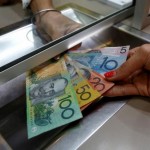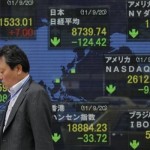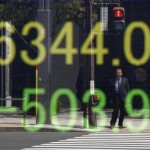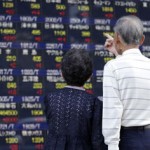Yen Holds Biggest Gain in a Week on Stock Drop
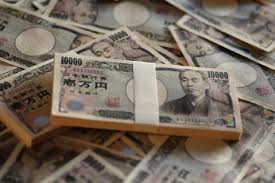
The yen remained higher after a gain yesterday that was the biggest in a week, as U.S. stock futures point to declines in the Standard & Poor’s 500 Index and after Japan reported a bigger-than-expected current-account surplus.
The currency strengthened against the dollar after U.S. equities retreated from a record. The Aussie rose after a private gauge of business confidence climbed last month to match the highest level since January. New Zealand’s dollar reversed earlier declines that came after a report showed business sentiment dropped to a 15-month low. Malaysia’s ringgit gained to the strongest since November on speculation the central bank will raise rates for the first time since 2011.
“The yen is being bought on the back of stock weakness,” said Yuji Saito, a Tokyo-based director of foreign exchange at Credit Agricole SA. “With U.S. stocks near record highs and vulnerable to profit-taking, the dollar is struggling to rise against the yen.”
The yen traded at 101.83 per dollar as of 7:27 a.m. in London from 101.86 yesterday, when it gained 0.2 percent, the most since June 27. The Aussie strengthened 0.2 percent to 93.94 U.S. cents.
The MSCI Asia Pacific Index (MXAP) of shares lost 0.1 percent after dropping as much as 0.4 percent. The Standard & Poor’s 500 Index of U.S. equities declined 0.4 percent yesterday after closing at a record high on July 3.
Japan’s finance ministry said today the nation had a current-account surplus of 522.8 billion yen ($5.1 billion) in May, reaching the most in three months and beating economist forecasts for a 417.5 billion yen gap.
Business Confidence
The yen climbed 0.6 percent in the past month, according to Bloomberg Correlation-Weighted Indexes that track 10 developed-nation currencies. The dollar lost 0.1 percent, while the euro fell 0.4 percent. New Zealand’s currency gained 3.4 percent, the best performance.
The New Zealand Institute of Economic Research’s gauge of business confidence fell to 32 last quarter from 52 in the period through March, according to figures published today.
New Zealand’s kiwi dollar traded at 87.68 U.S. cents from 87.59 after falling as much as 0.2 percent.
The Reserve Bank of New Zealand raised interest rates twice last quarter, boosting what was already the highest borrowing benchmark among major developed economies. A Credit Suisse Group AG index estimates policy makers will add 92 basis points to the 3.25 percent cash target over 12 months.
“Kiwi bears will continue to find it difficult to fight the flow when the RBNZ is likely to hike again,” said Sean Callow, a senior currency strategist at Westpac Banking Corp. in Sydney.
Australia’s dollar gained after a National Australia Bank Ltd. measure of business confidence in the nation rose to 8 in June, matching its February level and the highest since a reading of 9 in January.
The ringgit rose as 14 of 19 economists surveyed by Bloomberg News predicted Bank Negara Malaysia will boost the benchmark rate to 3.25 percent from 3 percent on July 10. The currency added 0.3 percent to 3.1785 after gaining to 3.1772, the strongest since Nov. 20.
Source: businessweek










